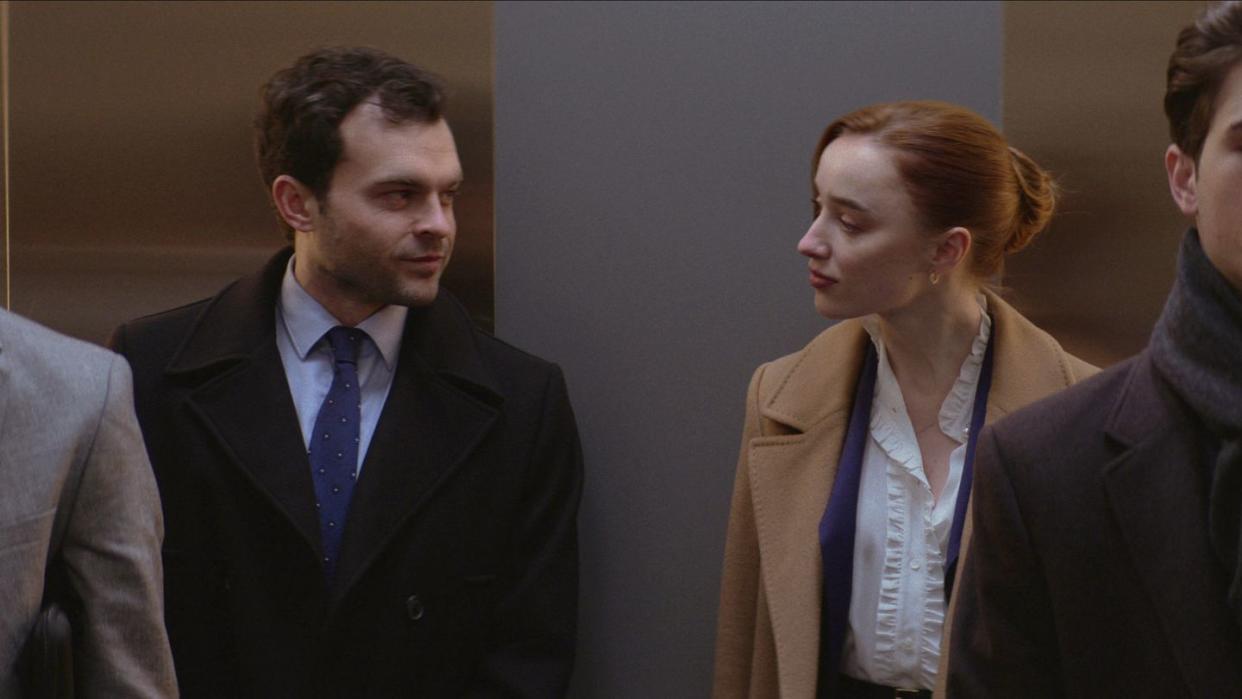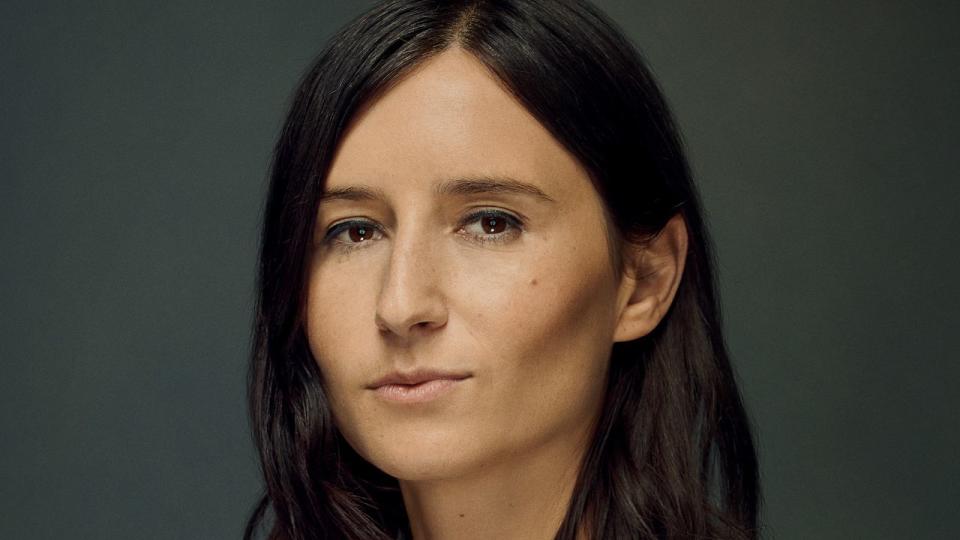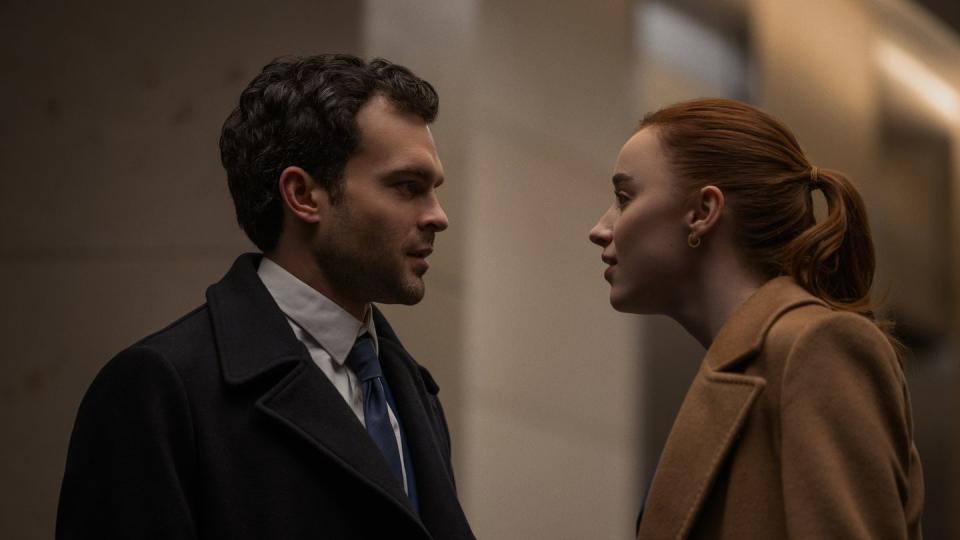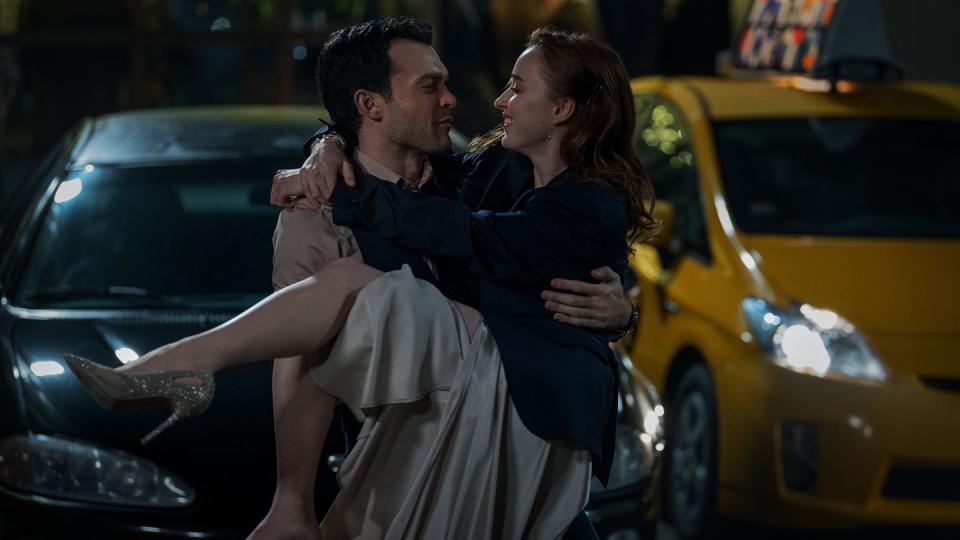“Fair Play” Explores the Dynamics of Power and Pleasure

- Oops!Something went wrong.Please try again later.
- Oops!Something went wrong.Please try again later.
Chloe Domont knows that Fair Play, her provocative thriller about a young couple whose engagement falls apart in the merciless milieu of hedge fund management, will be up for debate. After all, in the eight months since her buzzy feature debut premiered at Sundance, where Netflix acquired the distribution rights in a massive $20 million deal, the burgeoning writer-director has found herself having complicated conversations about the deep-seated hold that gender roles continue to exercise on society at large.
“I always knew that the film could be very triggering for women, but coming out of recent screenings, I’ve seen that it’s actually also very triggering for men,” Domont tells Harper’s Bazaar on a recent video call. “It’s gotten people asking a lot of questions, which I think is really exciting, [and] that’s the best thing I could hope for. More than this being a film about female empowerment, this is really a film about male fragility.”
Drawing inspiration from Russian director Andrey Zvyagintsev’s 2017 Oscar-nominated film Loveless and the classic psychological thrillers of David Fincher, Fair Play—which premieres Friday on Netflix—tells the story of Emily (Bridgerton’s Phoebe Dynevor) and Luke (Solo: A Star Wars Story’s Alden Ehrenreich), whose passionate romance has been largely kept under wraps due to a company-wide policy against office relationships at their cutthroat financial firm in New York City. But when Emily is promoted to the portfolio-manager role that Luke had coveted—which effectively means Luke must work under her, as her main analyst—the power dynamics in their relationship shift, and the lovers are forced to confront the unnerving limits of their own ambition.
“I wasn’t interested in making something that was black and white; I very much wanted to lean into the grays as much as possible,” says Domont, who felt she could draw parallels between her own experiences as a woman navigating Hollywood and those of women working in corporate finance. “I didn’t want to make Luke a clear villain. Yes, I do think he crosses the line at some point in the film. But up until that point, I did want the audience to go back and forth or empathize with [both of] the characters at different points.”
Below, Domont unpacks Fair Play’s fundamental observations about how gender, sex, and power interact within both a highly competitive industry and a modern, feminist society, and explains how the film has forced her to reevaluate some of her own past relationships.
Emily has to prove herself in an all-boys’ club by learning to play the game, and part of that requires her to bend her own moral compass and play dirty to get what she thinks she deserves.
I’ve always said that Emily is not a hero. She’s a human, she’s messy, she’s ugly at times, and she’s ambitious. At the end of the day, she wants her piece of the pie. That being said, I do feel like a lot of her behavior is reacting to what’s coming at her; for the most part, she’s not the one instigating this kind of abuse. I feel like once you’re in that kind of toxic environment [not only] in a workplace, but also in that kind of toxic relationship, it brings out the ugliest side of you too.

And on the other hand, you have Luke, who loves her for her intelligence and her drive to succeed, but ends up resenting her for those same traits. What kinds of conversations did you have with Phoebe and Alden about the gender dynamics that are at play in this film?
Luke represents a certain generation of men caught between wanting to adhere to [the principles of] a modern, feminist society [and] still having been raised on traditional ideas of masculinity. To me, that intersection is where the conflict lies between men and women today. I was even saying to Alden and Phoebe on set: If Luke had continued to succeed and been just one step above Emily, they would’ve had a great relationship, because a man’s success for the relationship is always [considered] a win. But when it’s the other way around, it’s suddenly a threat. Even if there’s support from a male partner, there’s still this feeling in a lot of relationships that a woman being big makes a man feel small, or a woman’s accomplishment can feel like a poor reflection of a man’s self-worth.
This is a man who, unfortunately, when things do shift, doesn’t know how to deal with it, so he pushes it down. And when he pushes it down, it starts to fester into a poison and comes out in really dark ways. What I really wanted to show in the script and through Alden’s performance is the struggle—and there’s pain there. He genuinely wants to support her, but he’s wired a certain way and trying to fight against it, [and] at a certain point he can’t.
Emily and Luke begin the film very much in love and are able to make a clear distinction between their personal and professional lives. But once upper management gives Emily a promotion over him, Luke no longer feels like he’s in control at work and instead tries to take control behind closed doors.
We talked about how they have this very animalistic lust for each other, and I think a lot of that animalistic desire comes from the high-stakes nature of their work. This is a couple that works hard and then plays hard, and the only way to get through or just let go of the pressure is to fuck it all out. And in that way, when they’re on the same page, it works for them. But as soon as things shift and he feels emasculated, he doesn’t want to give that to her anymore. And her not being able to have that release, and what that does with the tension in their relationship, [and] how that feeds to things imploding, is something we all discussed.

You’ve spoken openly about how you used to minimize and hide your own accomplishments with former romantic partners. How has the process of writing and making this film forced you to reexamine those past relationships?
I’ve developed much more empathy for the male character and realized that, in many ways, men can be victims of a system as much as women. [They’re] still treated very differently, but I don’t judge Luke for having these feelings. Obviously, what he does with his feelings at a certain point is pretty drastic and takes dark turns. But I don’t think those feelings make him a bad guy.
If anything, I’m just realizing that this is a societal systemic problem. As a society, we raise boys to believe that masculinity is an identity, that masculinity means one thing, that success is a zero-sum game. If we raise all these boys to believe that they have to fit into a box and then they don’t, it’s like we’re setting all these men up to fail in many ways, and I don’t believe that is their fault. There’s never been a platform for men to express their feelings, so what do they do with their pain?
Do you think we’ll ever reach a point where we’re able to decouple female empowerment from male fragility, or are they too deeply intertwined that one can no longer exist without the other?
No, I believe that we can. [Smiles.] As we’re raising the future men of our society, if there’s a way to raise them that breaks away from these traditional ideas of gender roles, I think that is what needs to happen to really dismantle that link.
You’ve previously mentioned that the final minutes of the film follow Emily as she decides how she is going to hold Luke accountable for his actions. For her, what does that kind of accountability look like? What did you want to convey in those final moments between these characters who have done irreparable damage to each other?
[Emily] is a woman who’s been pushed to the brink, who’s been cut down on every single level. There’s been emotional, verbal, and physical violence. She tries to use her words to confront him, but this is a man who refuses to be held accountable on any single level, so she has to use the same kind of physical force that he used against her to reclaim the power that he felt was robbed of him. And unfortunately, it needed to go to violent places. But I do think that there’s definitely an element of wish fulfillment in that ending scene, and there’s this feeling like, Enough is enough.

In the last scene, [Luke] is suddenly acting normal again. He’s acting like he never hurt her, and he’s talking very calmly about the way they’re going to separate their belongings after all the abusive behavior. I just wanted to sound the alarm and be like, “These are things that have been normalized in many ways, and they shouldn’t be.” But ultimately, it’s really about getting a man to face his own inferiority. For me, the whole film really isn’t about revenge; it’s about getting him to face the thing that he’s running away from, that has caused all this pain. To me, the whole movie builds up to the line: “I’m nothing.” And once he does acknowledge that, you see him break down and finally release all these things that he’s been holding and fighting against.
This interview has been edited and condensed for length and clarity.
Fair Play premieres on Netflix on October 6.
You Might Also Like

